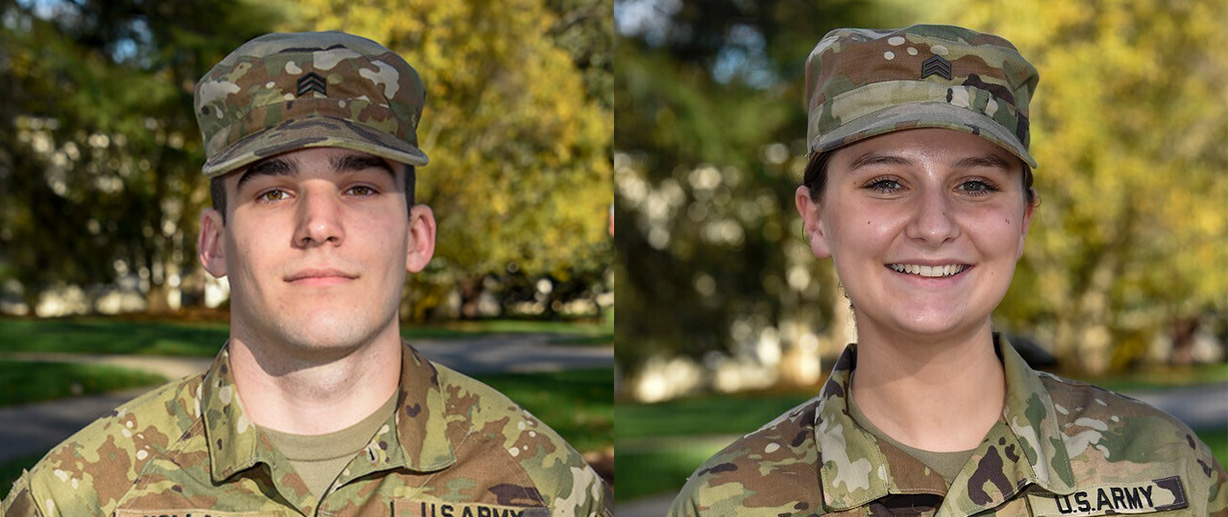Simon Holland ’25 and Katie Sullivan ’25 spent their summers with ROTC cadets from across the United States fine-tuning their understanding of languages critical to the United States military.
Holland, an international affairs major from Columbia, South Carolina, studied Arabic in Jordan. Sullivan, a Chinese and international affairs double major from Norfolk, Virginia, studied Chinese in Taiwan. Both participated in Project Global Officer (Project GO), an initiative of the Defense Language and National Security Education Office.
According to Maj. Nicole Dallocchio, professor of military science and head of the Reserve Officer Training Corps at Wofford, Project GO promotes critical language education, study abroad and intercultural dialogue with the goal of improving national security. The project provides fully funded opportunities for ROTC cadets.
“The major obstacle facing ROTC students working toward a critical language degree is the heavy semester course loads in addition to military requirements. Roughly a dozen of our cadets participate in athletics, which places additional strain on their schedules,” says Dallocchio. “Army ROTC incentivizes cadets who study Arabic and Chinese at Wofford. The Project GO scholarship is another incentive that Army ROTC can offer students, and it also aligns with Wofford’s mission and core values.”
Holland, who attended Air Assault School before studying in Jordan, was among 10 ROTC cadets from across the United States participating in his program at Qasid Arabic Institute in Jordan. He says it was a rigorous academic experience that involved spending four hours a day in the classroom as well as opportunities to explore the country and experience its culture.
“Wadi Rum was breathtaking,” says Holland of the World Heritage Site. He also visited the Dead Sea, Red Sea and Ajloun Castle.
It was his first time abroad, and he received support from and was prepped by Dr. Youness Mountaki, Wofford assistant professor of Arabic, and former teaching assistant Maysaa Abushawish.
“Taking a critical language can help your career,” Holland says. “My dream career in the military would be in the Ranger Battalion, and knowing Arabic could help with that.”
Holland is challenging himself learn dialects as well. “Fluency is definitely the goal,” he says.
Sullivan’s time in Taiwan also was her first study abroad experience. She was one of 27 cadets who spent a week studying at the University of Montana before traveling to Taiwan and spending nine weeks in the country at the National Taiwan University in Taipei.
Sullivan, who comes from a military family, began taking Chinese in eighth grade. She searched for a liberal arts college offering an ROTC program and the opportunity to study Chinese.
“Wofford was the only place I visited with a Chinese department,” says Sullivan, who learned about Project GO through Dr. Yongfang Zhang, Wofford associate professor of Chinese.
Sullivan spent six-hour days in the classroom and too assessments that gauged her ability to speak, read, write and comprehend Chinese.
“This program helped make sure I didn’t have a summer slump because of the rigor,” Sullivan says, who was able to experience night markets in Taiwan and spent time surfing and scuba diving during a visit to Lambai Island.
“The care that was put into curating the trip was miles beyond anything I could have imagined,” Sullivan says.
Dallocchio also extends her gratitude, both to the U.S. Army and the college. “On behalf of the Department of Military Science, I’d like to express my gratitude to our faculty and staff who support, advise and mentor our cadets,” she says. “Academic outcomes are the top priority and weigh heavily in determining future career paths in the Army.”
